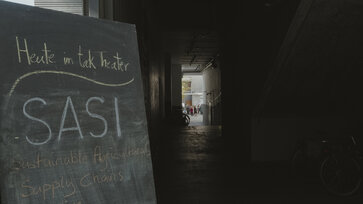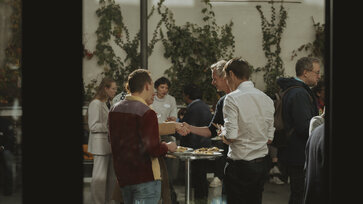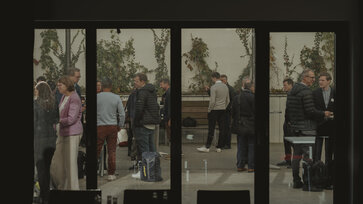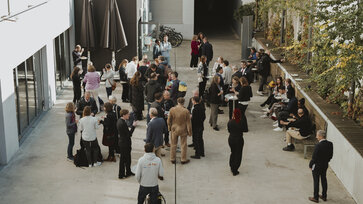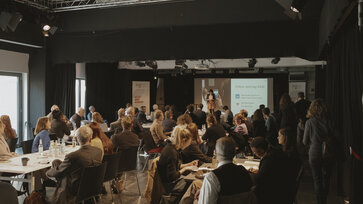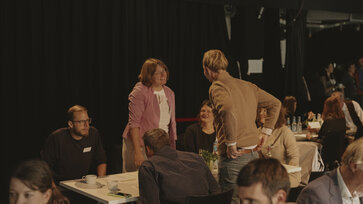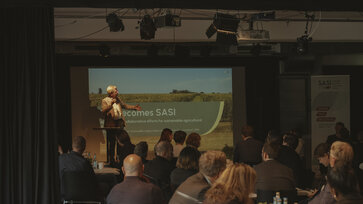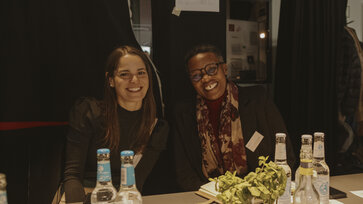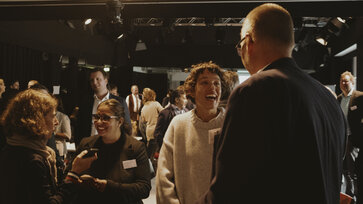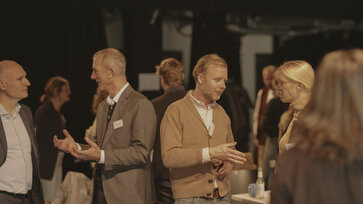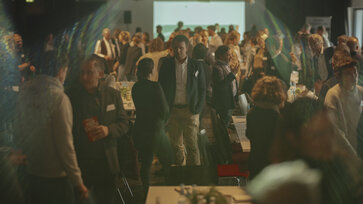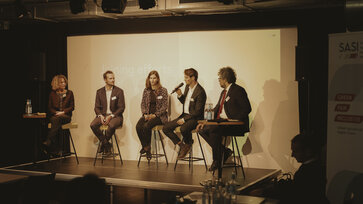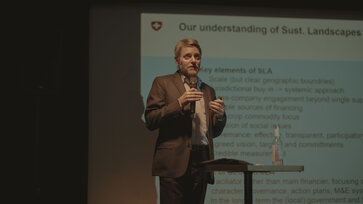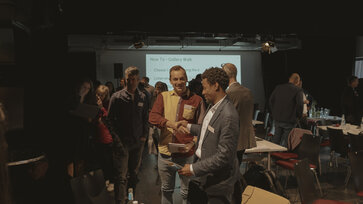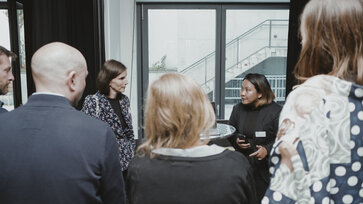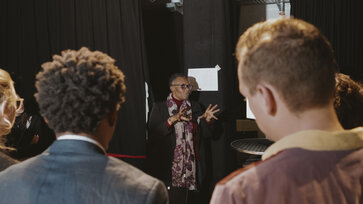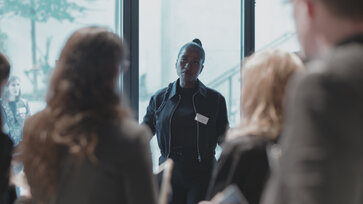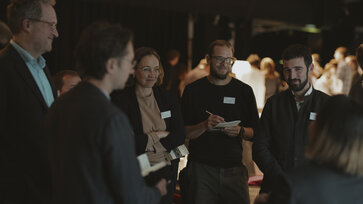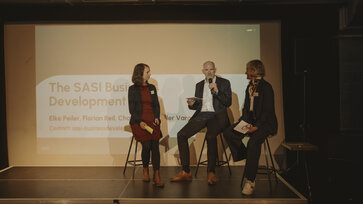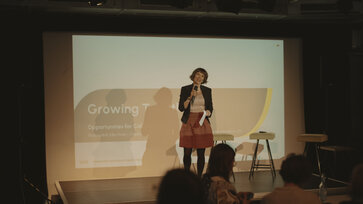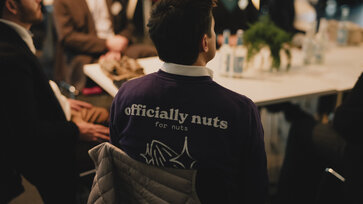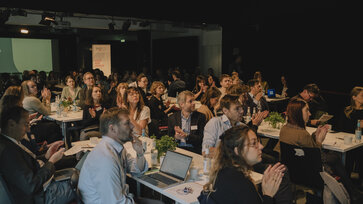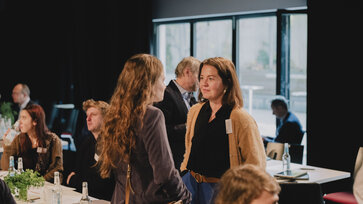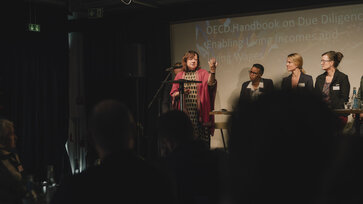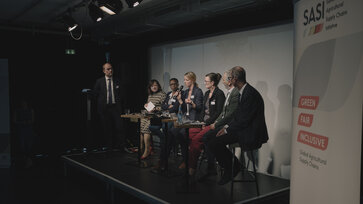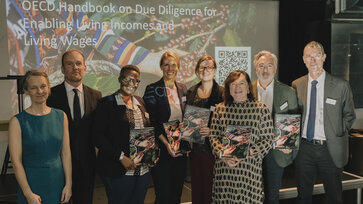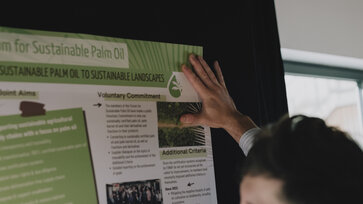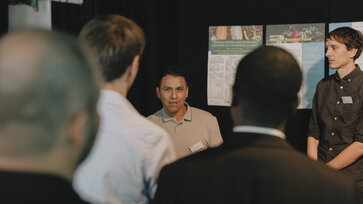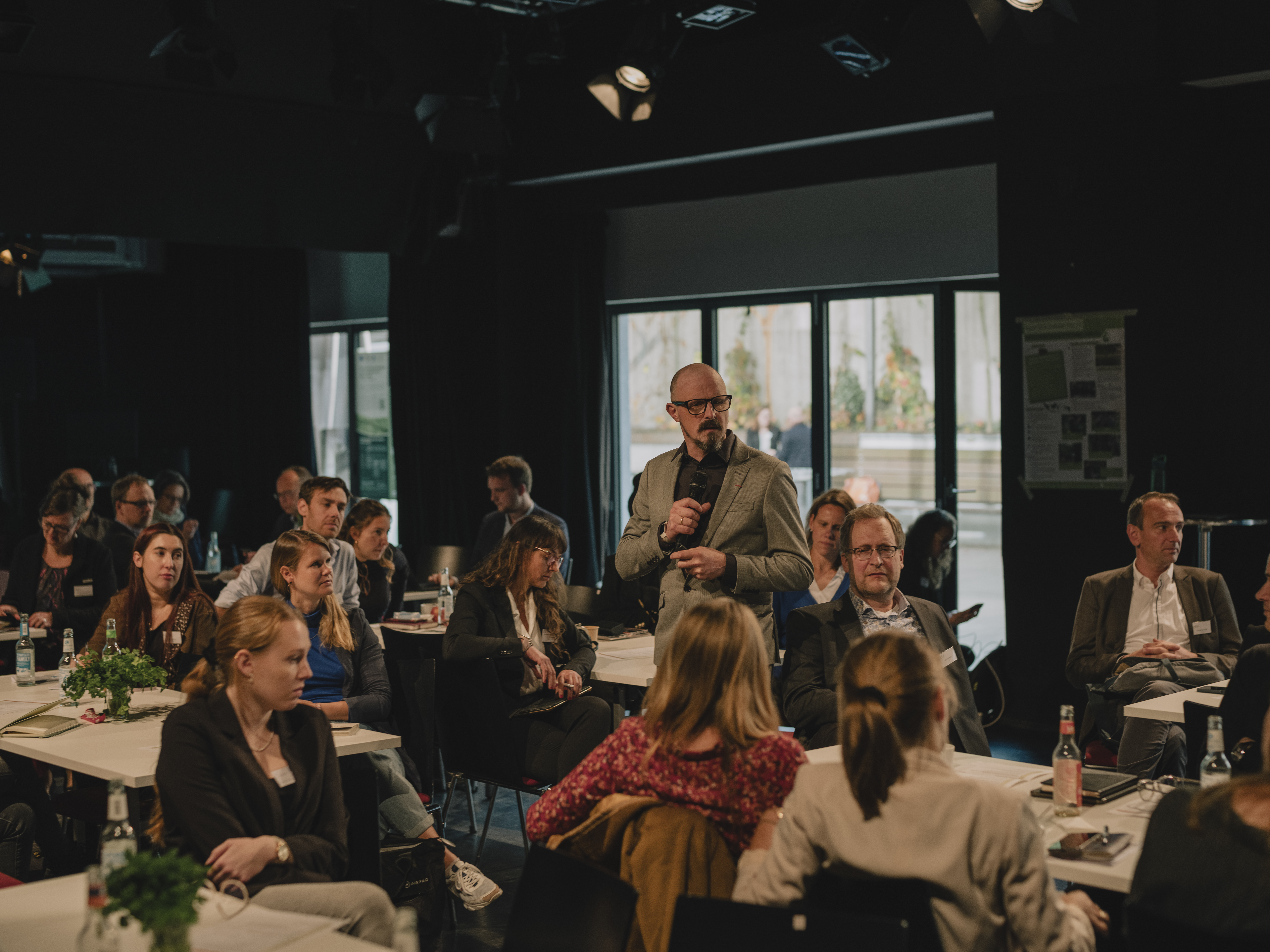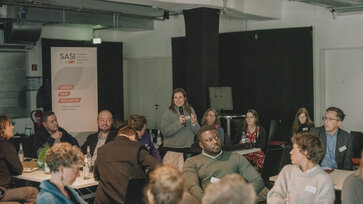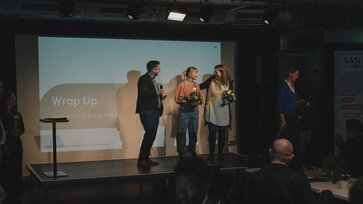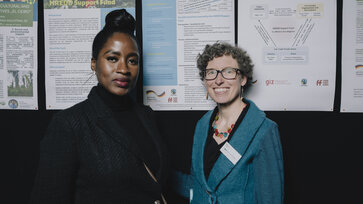Stakeholder meeting of the new SASI: More than the sum of its parts
120 people in one room for two days: the annual meeting of key players in global agricultural supply chains in Berlin is not just the launch of SASI this time - the meeting of companies, civil society and politicians is a close-knit gathering to strengthen sustainable action. Chronology of a two-day operation on the open heart of the global agricultural and food system.
An article by Jan Rübel
With white chalk on a black board, the Berlin tak Theater announces the only performance of the next two days on the sidewalk. A few minutes before the start, dozens of performers hurry past the sign to the entrance - towards a special play. They won't be reciting texts, however, but getting to the bottom of a question: How can global agricultural supply chains be made more sustainable, for the benefit of all? “We are in a paradigm shift,” says a woman on stage inside. “It's no longer a question of whether you live it, but how,” says Bärbel Kofler, Parliamentary State Secretary at the German Federal Ministry for Economic Cooperation and Development (BMZ), referring to the ongoing transition of global agricultural and food systems and their supply chains. “All stakeholders must be brought together to cooperate on their implementation.”
The room here represents the whole world on a tiny scale. 120 people from business and science, civil society and politics - they will spend these two days exploring challenges and best practices, legal requirements and their impact. They will share experiences from their work on agricultural supply chains, evaluate the status quo and want to define ways forward: all under the umbrella of the newly founded Sustainable Agricultural Supply Chains Initiative (SASI), financed by the BMZ and implemented by the Deutsche Gesellschaft für internationale Zusammenarbeit (GIZ).
Paul Garaycochea outlined the initial situation in his introductory remarks. “Global agricultural supply chains shape the lives of many millions of people,” says the head of department at the BMZ. “700 million live in extreme poverty, climate change and deforestation are causing crop losses.” Substantial action for sustainability has its costs. “But inaction will become more expensive.” SASI would offer a flexible and comprehensive toolbox for partner countries, companies and producers. “This is based on the experience and expertise of existing GIZ projects.” The sun shines brightly through the floor-to-ceiling side windows onto the black wooden floor.
The SASI initiative is driving over 150 such projects along supply chains worldwide, promoting sustainable practices in the areas of deforestation, regulation, gender equality, living income and digitalization - all cornerstones that the meeting will illuminate here. The new platform combines three previous BMZ projects: The Initiative for Sustainable Agricultural Supply Chains (INA), the Global Project Sustainability and Value Creation in Agricultural Supply Chains (AgriChains) and the Fund for the Promotion of Innovation in the Agriculture and Food Sector (i4Ag). Common goal: to achieve synergy effects and further develop the work; an association to be more than the sum of its parts.
In the rectangular hall, two illuminated screens at the ends create a field of tension. In between, 14 tables with seven seats each and a few rows of chairs to the side, all close together so that people can't help but get to know each other - for example during the thematic block “Sharing Experiences”, in which the 120 participants wander back and forth between six points of contact where specific lessons learned are discussed. “Access to finance is the main challenge for smallholder women farmers,” says Chrissa Marey Borja, Program Manager at Grow Asia, about a project to empower women in Indonesian cocoa supply chains. “We go door-to-door to educate women about market access and climate-friendly techniques.” Or Beatriz van Daim from Tradin Organic, who presents a new navigation tool for due diligence. “With the data we collect, we can identify which farmers risk not meeting the conditions of new trade regulations.” And there is Sarah MacKay from Producers Direct, who presents an AI tool: “Farmers upload a photo of their crop, the AI counts the fruit - then sends predictions and tips.”
![[Translate to EN:] Chrissa Borja](/fileadmin/_processed_/0/5/csm_Chrissa_Borja_15cc69fa85.jpg)
Chrissa Borja
During a short coffee break, Chrissa Borja leans against a pillar. The Filipina briefly checks her smartphone. How is she finding the meeting so far?
Chrissa Borja: It's fascinating to see how different regions around the world are striving to improve their supply chains. I recently met some participants from across Africa, and their strategies closely align with our efforts in Southeast Asia. This meeting offers a valuable opportunity for the Global South to share knowledge and learn from one another.
And what do you think of the guidelines discussed here that are emerging in Europe?
There are both opportunities and challenges. However, since we primarily work with smallholder farmers, I see a particular need to ensure they have better access to the information required to meet these new standards.
Are they being left alone?
The issue isn’t a lack of information but rather improving smallholder farmers' access to it. Farmers typically don't go online for training, so intermediaries and local organizations are essential to bridge that gap. The need for these guidelines isn’t new—it was urgent yesterday and remains critical today.
How did you get your job?
It actually came to me. I originally came from an environmental planning background. It fascinated me to then go more into the implementation of planning.
Two political processes frame the Berlin stakeholder meeting: on the one hand, there is the EU regulation on deforestation-free supply chains (EUDR), which was postponed by one year this October. And then there is the EU Supply Chain Directive with its agreed due diligence obligations - both powerful instruments. “EUDR is a game-changing tool,” says Indra Van Gisbergen at the panel on the Team Europe Initiative launched by Germany, which supports partner countries in the transition to deforestation-free supply chains. “The postponement of the EUDR is at the expense of forests and is bad news for farmers and indigenous peoples,” criticized the forest governance campaigner from Fern. Simon Gmeiner from the EU Commission replies: “We stand by the goals of the EUDR. We just want to give the stakeholders more time.” We are at a crucial moment. “This is not a slowdown. It's now about stepping up efforts.” Lisa Kirfel-Rühle from the BMZ puts it similarly: “You don't have to wait a year now, you can get started now,” says the deputy head of division with a view to the private sector. And Hamad Mota Kalaf, a diplomat from the Brazilian embassy in Germany: “We welcome the postponement. The important goal of deforestation should be done in dialog with partner countries to ensure operationality.”
![[Translate to EN:] Indra Van Gisbergen](/fileadmin/_processed_/4/e/csm_Indra_Van_Gisbergen_a95602686f.jpg)
Indra Van Gisbergen
Outside, a reddening sun still shines warmly against the fall. Indra Van Gisbergen takes a quick breath of fresh air.
In your opinion, what was not addressed at the meeting today?
Indra Van Gisbergen: The discussion about the concrete ingredients for effective partnerships with producer countries could have been expanded a bit more. The engagement in effective partnerships requires a comprehensive approach including strong political engagement on both sides to tackle the root causes of deforestation and address sensitive issues such as corruption and shrinking civic space as well as clarity around economic incentives for the producer countries. The EU has recently presented a Strategic Framework for international cooperation in support of the European Deforestation Regulation, a new flagship legislation. Unfortunately, the Strategic Framework is weak on effective partnerships between the EU and producer countries. We did really discuss how to close this important gap and what Germany and SASI could do to create space for multi-stakeholders’ dialogues which is an essential component of effective partnerships.
Do Europeans reflect too little on their own role in supply chains?
Europe continues to have an enormous footprint on the forests of the world because of the products such as chocolate and coffee tainted with deforestation we buy every day in our supermarket. The EUDR aims to ensure deforestation-free products are put on our markets. It is extremely disappointing the implementation of the EUDR is postponed with one year. Climate change is real and urgent action of everyone is needed now. In this transition change from many actors including the consumer in Europe is needed. There needs to be more room for dialogue and also listen more to small scale farmers who wish to have a decent living income and a fair price for the products they producer. In this respect we may as chocolate eaters and coffee drinkers revise our daily habits and reflect upon our way of consuming impacting on forests and people.
The tables in the hall are adorned with small glass vases, but there are no flowers in them, just mint, parsley and dill. Everything appears to be geared towards functionality. One of the many different green DIN-A6 cards on the wall reads: “Do you think farmers have the best ‘field’ experience at this event?” Cooperation with them is at the heart of SASI's work, says Florian Reil from GIZ as he introduces the SASI Business Development Team on the podium, “and also with all other stakeholders”. With the new SASI platform, it is now possible to analyze more systematically which of the more than 150 projects should be scaled up. Charlotte Haeusler Vargas from the team adds with an appeal: “If you want to scale but are wondering how to do it - contact us!”
The stakeholder meeting is thematically divided into two parts. The first day is dedicated to projects along the agricultural supply chains, the status quo. The second, on the other hand, is dedicated to new beginnings and transition, and early in the morning we are already in the middle of a panel debate on the implementation of the EU Supply Chain Directive. “Will the financial sector also be included in an updated version?” is one question from the tables. “The Commission wants to look into this further,” replies GIZ advisor Peter Moehringer. “Sooner or later it will be added.” But how do buyers, retailers and producers agree on more sustainability? “The directive is a roof,” says Daniel Schönfelder, ”and contracts can form a floor underneath.” The Lead European Legal Advisor at the renowned Rutgers Law School warns against purchasing companies using contractual exit clauses to end a deal too quickly in the event of human rights violations. “But the buyer also has a responsibility.” There is no obligation to perfection, but to continuous improvement. The question of how to find out specific figures on production costs during contract negotiations comes from the floor. “You need long-term contracts,” Schönfelder replies. “Then they also open their cost books.” However, he adds, it is difficult to increase costs when the price is high.
![[Translate to EN:] Daniel Schönfelder](/fileadmin/_processed_/9/6/csm_Daniel_Schoenfelder_aa82158ce1.jpg)
Daniel Schönfelder
He breaks away from a small group at lunch. Daniel Schönfelder is a lawyer, what is his perspective on the challenges when it comes to sustainable agricultural supply chains?
Daniel Schönfelder: You can see how far some companies have already come. In agriculture and textiles, many companies have addressed important issues such as living income and purchasing practice. The trick is to pilot something like this and extend the great ideas of today to other sectors. Trucking, for example, can be described as the new textile in terms of human rights: Low-wage sector, increased risks and often no responsible purchasing practices, so the pressure is passed on to the most vulnerable, the truckers. The industry could learn a lot from the experiences of the textile industry.
What experiences have you had with companies?
There is this illusion that there are good and bad companies - as if the aim is to find only the bad suppliers in the supply chains. But in reality, the majority are gray, and they need to be brightened up. There are no simple solutions, only gradual improvement based on trust, transparency and shared responsibility.
What advice would you give your customers?
That there is no one hammer and one nail. Human rights measures must always be based on the specific situation; standard solutions, such as one-size-fits-all questionnaires that treat bananas like T-shirts, create bureaucracy but hardly any added value in terms of information - they need to be adapted to the specific risk scenarios of the supply chain in question, they need a willingness to engage in dialog and work together on solutions. And sometimes the nail is crooked and needs to be straightened first - through gradual improvement in dialog. Germany lives from exports and must be perceived as a good partner. But if we don't create equal opportunities, our concept will no longer work in the long term.
Of course, higher wages increase production costs. The Organization for Economic Cooperation and Development's (OECD) new handbook on due diligence to enable living wages outlines how this can develop into a benefit for all and will be officially presented at the stakeholder meeting; around 700 people have also joined online for this event. “This human right is a prerequisite for the realization of other human rights,” comments Kofler, Parliamentary State Secretary at the BMZ, on Living Wages. “Now we can see how we can practically achieve better living wages,” she says of the book. “It sets the direction.” Allan Jorgensen is standing next to her, “It's a great moment to be here,” says the head of the OECD's Center for Responsible Business Conduct. “Global supply chains are part of the solution to wage problems.” But what does that look like in practice? Katharina Wortmann, Group Director at Aldi Süd, speaks on the podium. “It's a journey,” she says, outlining her company's efforts to achieve better wages for farmers. “We can't do it alone, we often only buy ten percent of the harvest realized on a farm.” However, she sees a good change in buyers.
![[Translate to EN:] Torben Erbrath](/fileadmin/_processed_/f/a/csm_Torben_Erbrath_3c16db2e59.jpg)
Torben Erbrath
One person who knows his way around the business world is Torben Erbrath. The Managing Director of the Federal Association of the German Confectionery Industry has been working on sustainability in cocoa for years. What impressions does he take away from the meeting?
Torben Erbrath: It's a great exchange here, especially with these different players. Nobody stays in their bubble.
Have you come across anything new today?
Well, I wasn't aware of the large number of projects that SASI is implementing. I'm involved in the cocoa sector - it's exciting to learn from experiences in the coffee industry.
There is a lot of talk here about a journey towards sustainability. Are we on the right path?
I think so. It's just longer than some people imagine. And it needs more speed.
Where do you see global supply chains in five years' time?
That also depends on what countries like China and India do. Supply chains could be completely reorganized and then no longer supply the North from the South, but go to China instead.
Do you fear that the German Supply Chain Act or the EU directive will reinforce this trend?
They will certainly not be the main drivers, but they will definitely have an influence on availability. However, customs walls or economic agreements have a stronger impact.
Finally, Rainer Lademann will shed light on the relationships between buyers and producers in the shadow of competition in his lecture from a scientific perspective. “Producers are dependent on buyers,” says the honorary professor at the University of Göttingen. “The latter has better outside options.” But how do you increase the producers' share of the final price? In any case, Lademann also sees other factors for profitable action: “Company profits increase when they pursue a strong marketing strategy. This is not necessarily a question of company size.”
![[Translate to EN:] Rainer Lademann](/fileadmin/_processed_/e/6/csm_Rainer_Lademann_e194f8bee4.jpg)
Rainer Lademann
After his lecture, the audience surrounds him with questions. Then he gets himself a glass of water.
How far have we come in designing sustainable agricultural supply chains?
Rainer Lademann: We have certainly reached the awareness-raising stage, which is something. I generally perceive a willingness to participate among key players.
Where is the problem?
I wouldn't start with the supply chains, but with demand. As long as markets are saturated, prices will remain under pressure. A vicious circle of increased consumption due to lower prices and expansion of arable land has developed - with problems for our planet such as deforestation.
In your presentation, you talked about the idea of strong producers of raw materials such as coffee and cocoa introducing a kind of OPEC in order to improve prices for them...
Such an approach would not surprise me - after so many attempts to stabilize prices. It would not be a friendly approach, nor is it creative, and it is the exact opposite of competition. But if there is no other way, and deforestation continues, something like this will be considered.
It is early afternoon when it becomes fundamental and internalizing again at the end. Antonie Fountain doesn't choose one of the two stages at either end for his impulse, but goes to the middle of the room. “Most of us started working for sustainable chains to make the world a little bit better,” he says to those gathered around him. Fountain is co-founder and managing director of the Voice Network, a global alliance of non-governmental organizations and trade unions working to make cocoa supply chains sustainable. “It's a long journey full of disappointments.” Hope is not easy. But Fountain takes them on a different journey: He begins by outlining the progress made by humanity, the reduction in the proportion of people below the poverty line over the past 200 years, the fall in child mortality and the fact that human rights and environmental protection are now being considered together, the generally heightened awareness of good governance. He contrasts this negatively with rising global temperatures and dwindling forests. “We are in trouble. We must be aware that the world around us is burning.” So what can we do? In the end, he gives five words that would help: “Regulated, transparent, collaborative, professional and decommoditized - we just need to do five things! We can do it!” At the end of the meeting, his final sentences reflect what State Secretary Kofler and many others said during these two days, which ran like a common thread through the discussions: “The only constant is change. The question is: How do we change it?”
![[Translate to EN:] Stakeholder-Meeting der neuen SASI](/fileadmin/_processed_/d/9/csm_SASI_StakeholderGruppenfoto__2__ae5f8c1017.jpg)
